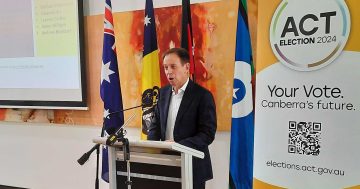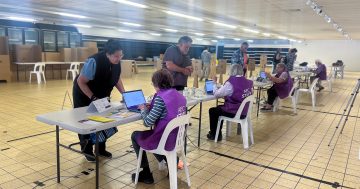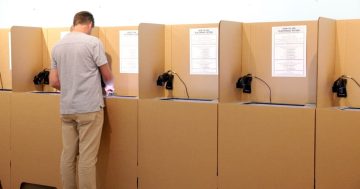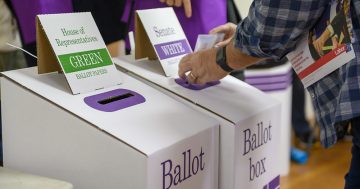
An ACT voter does her civic duty on 19 October, but half the electorate voted early. Photo: Michelle Kroll.
I embraced early voting for its convenience, casting my pre-poll a week before election day.
It was uncrowded, quick and seamless, although I have to admit I unexpectedly changed the order of my preferences after my first attempt on the touchscreen.
No queues, party spruikers or sausage sizzles, just in and out and done.
Yet, there was something about it that was just a little sterile, less significant and the distinct difference in the pre-poll and election day votes in both the ACT and Queensland elections has given me second thoughts.
Both polls produced a 50:50 split in the vote. In the ACT, pre-polls favoured the Canberra Liberals and were posted first, while in Queensland, they came in about 9:30 pm and snuffed out any flicker of hope for Labor that the election day votes had kindled.
I’m not saying the results in these elections would have been different without pre-poll voting.
Many will argue that the rusted-on supporters are more likely to use early voting and swingers will wait until a long as possible.
However, the doubt remains that two weeks, which can be a third of a campaign, is a long time before election day, and a lot can happen in those final days.
Late policy announcements, costings revelations, gaffes.
Queensland Labor’s strong surge at the back end of the campaign as the heavily favoured LNP faltered suggests that some early voters may have had buyer’s remorse.
In the ACT, the Canberra Liberals’ result could have been even worse, given a week before the poll that they would rather forget. Who knows, there could have been another independent.
All speculation, but if an election is to capture the will of the people at a certain point in time, then early voting, which only took hold because of the pandemic, starts to nibble away at this concept and its authority.
Is convenience enough of a reason to tamper with an electoral system that is arguably the safest, best run and fairest in the democratic world, which already has facilities for absentee and postal voting?
In the US, where elections are held on weekdays and are not run independently, queues can mean the difference between voting and not voting, so early voting is a necessity.
But in Australia, heading out to your local school hall to vote on a Saturday is hardly a chore, and while there may be a line, it doesn’t extend around the block and take hours to navigate.
The parties are already strategising about early voting and how to schedule the release of policies and the submission of costings for evaluation.
If early voting continues to gain popularity, what are the odds that unpopular or questionable policies, dodgy costings and bad news will left until after the two-week starting gate or as close as possible to election day?
Sometimes, it may feel like a campaign has been running for months, but it is only when the caretaker period kicks in that the rubber hits the road.
The other consequence that troubles me is a diminishment of election day as the primary point of decision for voters.
Australia has built, through compulsory voting, an electoral culture that fosters participation, a sense of occasion and respect for the communal civic action of choosing who represents and governs us.
We may not necessarily be fully engaged in between elections, but on the day, there is no doubt that, whatever the outcome, it is the right result.
Election day is one of the nation’s great festivals and a coming together; the community stalls and even the party supporters, with their how-to-vote information, contribute to that sense of occasion and legitimacy.
And yes, keeping party volunteers 100 metres from polling booths in ACT elections is unnecessary. I have never felt harassed or threatened, and everything has always been done with great civility and in the democratic spirit.
The primacy of election day should be preserved and the question of early voting needs to be addressed before it undermines this great communal rite.





















